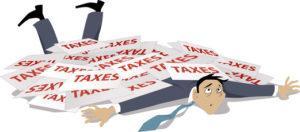
Brazil is known for its high taxes on businesses. In fact, it has one of the highest business tax rates in Latin America, second only to Argentina. Worldwide, Brazil ranked seventh for highest overall taxes in 2016.
Brazil's famous tax-laden economy affects all sectors. It includes four kinds of property tax, six kinds of income tax, two kinds of service tax, and five kinds of international business tax. Not only are taxes high, but also filing taxes is a time-consuming process. According to the World Bank's 2017 Doing Business report, Brazil ranks 181 out of 190 in a list of least efficient countries to file taxes. The report also estimates that filing taxes in São Paulo takes over 2,000 hours. Compare that to an average of 342 hours for the rest of Latin America and the Caribbean.
For businesses mired in such an expensive and time-consuming tax system, it seemed they finally caught a break in 2015 when Brazil's Superior Court of Justice ruled to exempt businesses from paying social security taxes on employee vacation bonuses. But in March of this year, the Supreme Court, led by Justice Luis Roberto Barroso, ruled against the decision, requiring businesses to pay taxes on all forms of employee payments, not just salary.
Barroso's definition of what is taxable has to do with whether or not a certain payment is "habitual" or re-occurring. And therein lies the problem. Whether or not vacation bonuses, maternity leave payments, compensation for early dismissal, sick leave, and other similar payments are "habitual" is open to interpretation. It is still unclear just how far the Supreme Court will take the definition of habitual as the final written opinion still has not been released.
In the meantime, businesses are taking the issue to court, where the majority of judges have ruled in favor of the businesses, exempting them from tax responsibilities on vacation bonuses and sick leave. The situation could easily change though once the Supreme Court's ruling is published.
